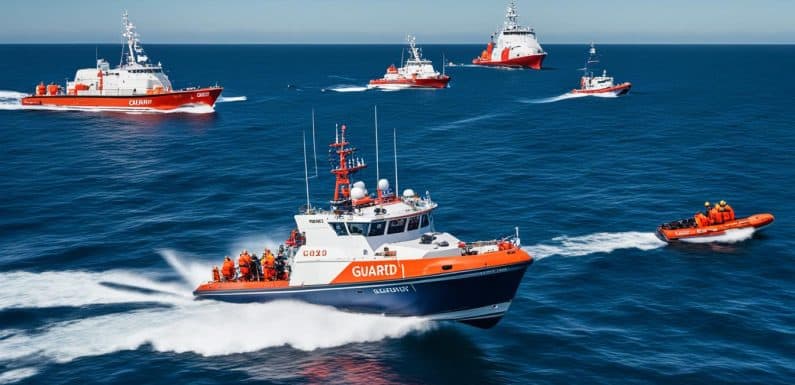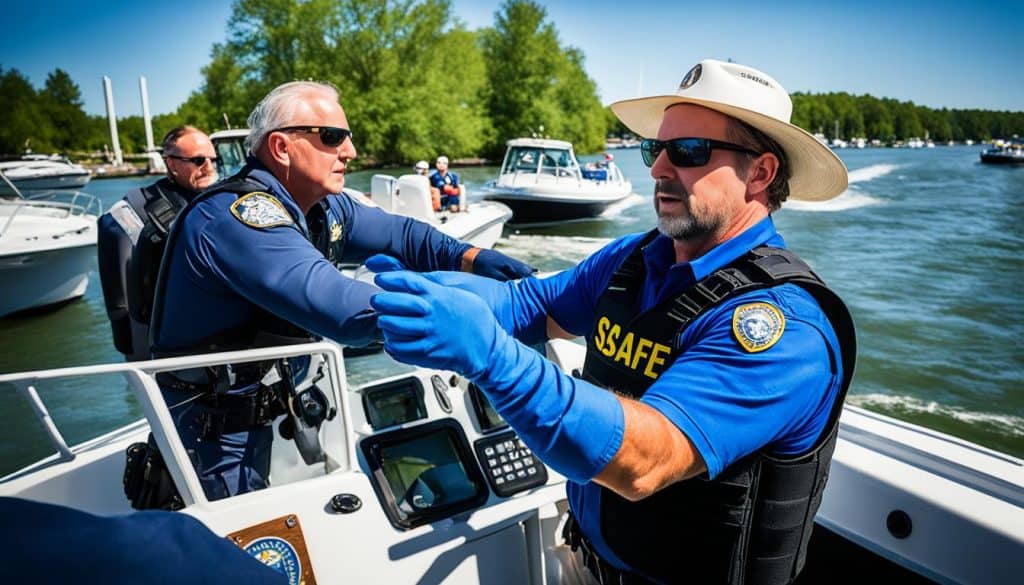
While generally, citizens must adhere to the instructions of law enforcement officers, certain circumstances legally empower you to refuse cooperation. It is critical to recognize that refusing law enforcement instructions can lead to severe repercussions, and thus, should only be done when one is well-informed about their rights and the law. Knowing your rights when stopped by a law enforcement officer is integral to navigating these interactions both responsibly and lawfully, ensuring that your legal obligations during police interaction are met without waiving your personal rights.
Key Takeaways
- Refusal to comply with officers is typically not advisable, but exceptions do exist under certain legal conditions.
- Understanding the fine line between lawfully refusing law enforcement instructions and obstructing justice is crucial.
- Being informed of your rights when stopped by a law enforcement officer can help safeguard your civil liberties.
- It is important to be aware of your legal obligations during police interaction to avoid unintended legal complications.
- Consulting legal help following an encounter with law enforcement where rights and instructions were in question is advisable.
Legal Framework: Compliance with Law Enforcement on Waters
Navigating the waters requires understanding the legalities involved, especially when it comes to the boating laws in Michigan and the law enforcement authority on water. The clear and structured regulations are in place to ensure safe and lawful boating practices. In this deep dive, we’ll explore the fibers of this legal tapestry, including the extensive reach of the US Coast Guard’s role in enforcing boating regulations on federal waters.
Michigan Boating Laws and Law Enforcement Authority
In Michigan, the waters are patrolled by dedicated officers granted the authority to ensure boaters comply with state laws. This authority encompasses various aspects such as safety checks, enforcement of navigation rules, and responses to waterborne incidents. Knowledge of these laws is imperative for every boat operator to prevent penalties and ensure a harmonious relationship with marine law enforcement bodies.
Boarding and Inspection Procedures by Officers
Officers on the water have clearly defined procedures for boarding and inspection. These standardized protocols serve a dual purpose: protecting the rights of boat operators while also ensuring compliance with applicable safety regulations. It is the responsibility of boaters to not only be familiar with these procedures but to also cooperate when approached by an officer.
The Role of the US Coast Guard on Federal Waters
The United States Coast Guard is the titan of enforcement on federal waters. Their role is pivotal in upholding the laws that govern our mighty seas and mighty lakes, which includes search and rescue operations, environmental protection, and of course, regulation enforcement. Understanding the scope of the Coast Guard’s authority is essential for those venturing beyond state jurisdiction into the realms of federal waterways.
| Authority | Scope of Action | Key Responsibilities |
|---|---|---|
| Michigan Law Enforcement | State Waters | Enforcing boating laws, compliance checks, accident investigation |
| US Coast Guard | Federal Waters | Search and rescue, environmental protection, regulatory enforcement |
As we delve into the specifics, it becomes increasingly apparent that the authority on Michigan’s waters is not unilateral but a concerted effort between state-based bodies and federal entities. Awareness of these layers of authority, coupled with comprehension of your responsibilities, forges the cornerstone of a mutually respectful and lawful maritime experience.
What Happens When You’re Asked to Stop by Law Enforcement Officers?
On both land and sea, encountering law enforcement officers and understanding how to react when signaled to stop is of vital importance. While situations may vary, the fundamental steps you take can have significant legal implications. Recognizing visual and audible signals from law enforcement officers and responding appropriately is not just a matter of courtesy but an essential requirement to ensure safety and compliance with the law.
The Importance of Visual and Audible Signals in Compliance
Visual and audible signals are critical methods used by law enforcement officers to grab the attention of a civilian and are pivotal in maintaining order and safety on public roadways and watercourses. When stopping for law enforcement officers, the signals—whether they be flashing blue lights, a siren, or hand gestures—are a universal language indicating that you must yield and prepare to interact with an officer. Failing to acknowledge these cues can lead to escalated enforcement actions and is often seen as a refusal to comply.

Consequences of Not Stopping for a Law Enforcement Vessel
Let’s examine the consequences of noncompliance with police orders when on the water. Ignoring the directive to stop can lead to a cascade of legal troubles, ranging from hefty fines to more severe criminal charges, depending on the jurisdiction and context of the incident. Therefore, it’s crucial for boaters to recognize and understand their responsibilities under the law to avoid unnecessary complications or legal repercussions.
| Actions | Consequences |
|---|---|
| Failing to stop for an officer | Monetary fines and potential vessel seizure |
| Ignorance of visual/audible signals | Charges of noncompliance or obstruction |
| Repeated refusal to comply | Increased fines, legal charges, and possible incarceration |
In conclusion, adhering to directives and comprehending the importance of visual and audible signals are non-negotiable aspects of interacting with law enforcement officers. By understanding these imperatives, individuals can ensure their encounters with police are resolved safely and legally. Always remember that your immediate actions when flagged down have lasting implications, reinforcing the critical nature of compliance.
Specifics for Boat Operators: Adhering to Law Enforcement Directions
For boat operators, the importance of following law enforcement directions on the water cannot be overstated. To ensure both the safety of everyone on board and the security of the marine environment, it’s imperative that instructions from law enforcement are carried out promptly and accurately. This ensures a cooperative atmosphere between boaters and officers, crucial for maintaining order on our waterways.
Understanding “Slow, No Wake Speed” and Safe Distances
One of the key directives often issued by patrol boats is the enforcement of a slow, no wake speed. This is a speed set to minimize the formation of a wake—the waves that form behind a boat as it moves through the water. A no wake speed helps to prevent potential harm to other boats, the shoreline, and marine life. Additionally, boaters must understand and maintain safe distances from patrol boats to ensure that law enforcement officers can perform their duties without interference or hazard.

In situations where a patrol boat is conducting law enforcement activities, establishing a buffer zone between recreational vessels and officials is critical. This space allows officers to operate freely and approach or instruct other vessels with clear lines of communication. Adhering to these safe practices demonstrates respect for the rules of the water and aids in preventing accidents or misunderstandings.
Critical Response Expectations When Approached by Patrol Boats
When a patrol boat signals a vessel, the boat operator’s response should be immediate and deliberate. Being aware of the critical response expectations can facilitate cooperation with law enforcement and contribute to an expedient resolution of any situation. Boat operators should signal acknowledgment of any directions given and adjust their course or speed according to the directives.
| Signal from Patrol Boat | Expected Boat Operator Response |
|---|---|
| Flashing blue lights | Prepare to stop; await further instructions |
| Sound signals (e.g., siren or horn) | Reduce speed and navigate to allow clear passage |
| Verbal orders through loudspeaker | Comply promptly while maintaining safe operation |
| Hand signals | Follow directional gestures, maintain visibility to patrol |
Understanding these specifics and correctly following law enforcement directions on the water help uphold safety and legality. Boaters should always remain vigilant and responsive to law enforcement’s presence, ensuring their time spent on the water is a secure and enjoyable experience for themselves and their fellow seafarers.
Can You Lawfully “Follow Instructions from a Law Enforcement Officer?”
In understanding the delicate balance between exercising one’s rights and ensuring lawful compliance with police commands, knowing when and how to obey police instructions is not just a matter of legal obligation but of personal safety and civil duty. The legality of following law enforcement orders primarily depends on the context of the encounter and the nature of the instructions given. Whether during a routine traffic stop, a public safety check, or an emergency situation, compliance is typically expected and required by law.
However, the question arises on what grounds one might question or lawfully refuse an officer’s commands without facing immediate legal repercussions. Specific circumstances warrant such a stance, particularly when an individual has reasonable belief that an officer’s orders are unlawful or infringing on their constitutional rights. It is paramount to remain informed about what these circumstances entail as the judiciary system offers certain protections to citizens under the Fourth and Fifth Amendments. Of course, it is advisable to seek legal counsel when in doubt of the legality of following law enforcement orders.
While lawful compliance with police commands is a cornerstone of public order and legal process, it should be understood as a two-way street, wherein law enforcement officers are also expected to exercise their authority within the bounds of legality and respect for civil liberties. Whether you are navigating the roads or interacting in the public sphere, an informed citizenry is critical in fostering a society where the rule of law and mutual respect govern the relationship between the public and law enforcement.
FAQ
When are you allowed to refuse to follow instructions from a law enforcement officer?
What are the boating laws in Michigan and the authority held by law enforcement officers?
What are the procedures for boarding and inspecting vessels by law enforcement officers?
Why is it important to comply with visual and audible signals from law enforcement officers?
What are the potential consequences of not stopping for a law enforcement vessel?
How can boat operators adhere to law enforcement directions on the water?
Is it legally required to follow instructions from a law enforcement officer?
Source Links
- https://www.boat-ed.com/michigan/studyGuide/Who-Enforces-Boating-Laws/10102302_37955/
- https://www.boat-ed.com/wisconsin/studyGuide/Who-Enforces-Boating-Laws/10105102_51084/
- https://www.quora.com/Would-it-be-legal-to-refuse-to-follow-an-instruction-from-a-police-officer-if-you-honestly-but-mistakenly-believed-that-following-the-order-would-be-dangerous-to-your-health
